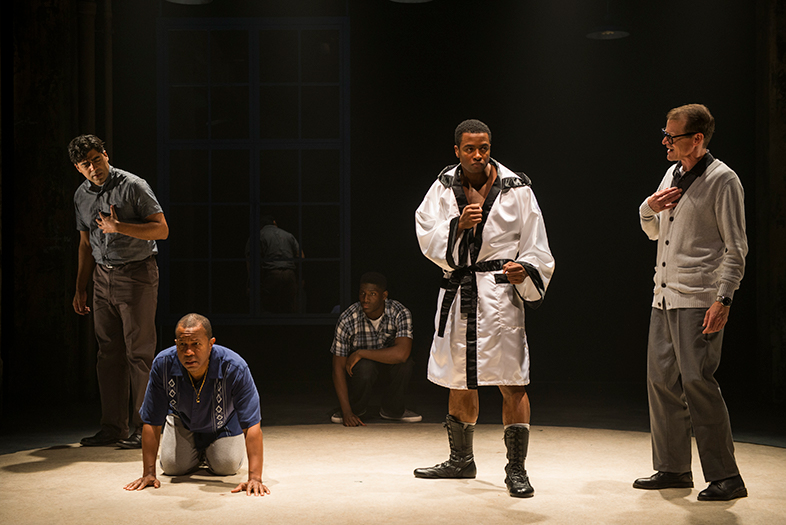In 1962, television viewers across the nation watched, mouths agape, as boxer Emile Griffith delivered blow after blow to the head of his opponent Benny Paret. The last blows ultimately proved fatal; Paret died after a ten-day coma. It was an event so shocking that the sport of boxing was barred from free television until the 1970s.
This moment is the axis on which the narrative of Man in the Ring, a new play running until October 16 at Court Theatre, spins. The play weaves together the perspective of an older, ailing Griffith (Allen Gilmore), suffering from cranial trauma-induced dementia, and that of Griffith in his prime (Kamal Angelo Bolden). These two incarnations interact with each other like specters in their respective peripheral visions: as the elderly Griffith mumbles to what seems to be himself, his younger self stands in the background—the ghost lingering in his mind. “You’ve got champagne dreams, boy,” he tells his starry-eyed youth.
But his former self is not the only ghost. Griffith—a gentle soul in a sinewy body whose first ambition was to make women’s hats—mourns his accidental killing of Paret (Sheldon Brown). He relives the battle in one flash, a highlight of the play. The momentary strobe lights capture a tableau of the two men in the midst of fighting in a far more effective manner than showing the actual fight in its entirety ever could. It is one of many expressionist moments where the haziness of memory is personified through evocative techniques, such as actors taking on multiple roles and singing Caribbean children’s songs to transition between the scenes, reflecting the boxer’s ancestry.
In that sense, Man in the Ring represents some of the best aspects of contemporary theater’s propensity for portraying feeling rather than chronology. We truly empathize with the current of memory as shown, at once dreamlike and jolting. But at a slim ninety minutes (including intermission), the play could have spent just a little more time delving into the events of a story that is quite gripping on its own. Though much attention is paid to Griffith’s covert gay dalliances—it was Paret’s homophobic remarks that ignited Griffith’s fatal anger at him in the first place—less is given to his feelings regarding his own sexuality. Likewise, we are never given access to the boxing world that seems to know Griffith’s secret so well—what, if anything, did Griffith even enjoy about the sport and his fellow boxers?
Despite there being room for more, Man in the Ring succeeds at evoking the guilt of a man who no longer recognizes himself as he was or as he is. Both actors do an impressive job at bringing out the different sides of the character, his brashness and later his frailty, whilemaintaining his gentleness and playfulness in both personas. Though Bolden saunters and Gilmore hobbles, they both share a twinkle in the eye and a broad smile. The young Griffith’s physique is described with the line, “You can serve dinner for six on those shoulders,” and Bolden is expertly plausible as a naturally gifted boxer: at one point, he does several pull-ups with one hand, and my seatmate and I turned to each other with wide, incredulous eyes.
Though Griffith is haunted until the end of his life by Paret’s voice, he tries to make amends with his son (smartly played by the same actor as Paret), only to mentally devolve and begin apologizing to Paret himself. Though Paret’s son feels the forgiveness is not his to give, he ultimately concedes to comforting Griffith. The scene, which could have been saccharine, ends up making us feel the easing of nearly forty years’ worth of pent-up guilt.
A play about boxing could have easily isolated more arts-inclined theatergoers (which might be assumed to be the majority of that specific population), but the story itself is so intriguing and the execution so lively and cerebral that the play can engage anyone, regardless of their interests. As someone who abhors sports, I still found myself engrossed in the mind of one damaged by its brutalities. Playwright Michael Cristofer chose to expand a horrific event in the world of boxing into a meditation on memory, aging, and repentance; the result is a work that transcends the field of sports entirely and becomes something more inclusive. By choosing to hone in on the emotional and mental aspects of an athlete’s life rather than the play-by-play of his career, the play opens up his soul to a broader, empathic world.



